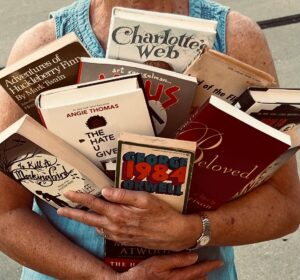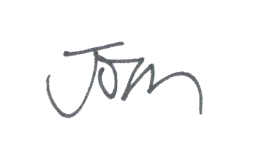 I am pleased to share Joan Fernandez’ recent “Digging In” post about banned books, a topic close to my heart. You can learn more about her and her upcoming historical fiction novel, Saving Vincent, available for preorder, here.
I am pleased to share Joan Fernandez’ recent “Digging In” post about banned books, a topic close to my heart. You can learn more about her and her upcoming historical fiction novel, Saving Vincent, available for preorder, here.
A LESSON IN GULLIBILITY
I remember a moment when my gullibility took a shock.
It was a sunny morning. Our kids were teenagers, I believe it was about 2008. We were on vacation in Germany. I’d decided to take the family on a quick twenty-minute train ride north of Munich to the medieval town of Dachau.
It’s July. Even so, not too hot yet. The smell of coffee and fresh baked goods from the train’s dining car made my mouth water, but the trip was so short we were at our destination before I could decide to go buy a pastry.
Dachau is now better known as a Holocaust Memorial site, the location of the longest running Nazi concentration camp of World War II. I’d carved out time for the day trip because of recalling bare-bone facts learned in World History classes long-ago. The Nazis had terrorized and killed at least 40,000 people in Dachau over the course of its twelve years of operation. It felt important to bear witness.
Inside a vast 20-acre complex, one of the first warehouse-like buildings we entered was probably a mess hall. And it’s here that my memory would sear with a realization.
Inside this echo-y space, several rows of double-sided panels with black-and-white photographs had been arranged. Alongside the photos were reproductions (and translations) of newspaper headlines and articles that had run in the local Dachau press during the years the camp had been in operation.
All the articles had lied with fabricated stories to explain away the strange goings-on in the camp to the local Dachau townspeople. The stories masked the brutal treatment, forced labor and executions going on behind the prison’s walls.
As I looked at the photos and read the headlines and captions, here’s what hit me: I would have believed these fake stories.
In an instant, I felt queasy. If I’d been living back then, I could see myself believing this false press. I wouldn’t have wanted to face something as dark as the reality behind these walls. It would have been easier to simply go along with planted fake stories instead of examining more closely what was actually in front of me.
The picture of my weak naiveté sickened me. I felt I would’ve been a coward.
I don’t want to be this person.
It took awhile but after that gut check I began to change. I took on projects at work characterized by ambiguity—discovering that I loved the evolution of ideas. I challenged myself to challenge consensus thinking. And I did my best to read more.
In retrospect, I was doubling down to renewed principles:
- To exercise critical thinking by turning to more than one source for information.
- To be open to new ideas and be willing to change those ideas.
- To never abdicate my authority on what I believe.
It’s within this context that you can imagine how the idea of shutting down critical thought and diverse ideas—in other words— banning books is reprehensible to me.
Banned Books Week 2024 – Now
The American Library Association’s (ALA) 2024 Banned Books Week is now (September 22-28). The reason for this focus is that the number of books being banned in the US is skyrocketing. Librarians and schools are being attacked.
From the ALA website: “In 2023 alone, the American Library Association’s Office for Intellectual Freedom tracked 1,247 efforts to censor books and other resources in libraries—an increase of 65% from the year before. In total, 4,240 unique book titles were targeted, many of them representing LGBTQIA+ and BIPOC voices and experiences.”
This crazy assault on the freedom of ideas got me googling lists of banned books and then turning to my own bookshelves. Have I read any of the books labeled as offensive?
Well, it turns out I own a ton of banned books. Here’s just five:
- How to Be an Antiracist,” by Ibram X. Kendi. Part memoir, part social commentary, this nonfiction offered a new lens for me on how to think about racism in our society. Like a fish that doesn’t recognize its in water, for me, the book brought to light assumptions I’ve held that reinforce “othering” others. This book is banned because it’s about racism. Yet, I’m keenly interested in considering whether I haven’t seen the water because I’m swimming in it.
- Charlotte’s Web by E.B. White – First book I remember making me cry. Not because (spoiler alert) the spider Charlotte dies, but rather that the pig Wilbur has been so touched by her life. Really, it’s lovely. Yet the banners’ argument against this children’s book is that humans are the highest level of God’s creation because we communicate by talking, so showing animals talking is sacrilegious. My cat told me that’s silly. God made cats too.
- Lord of the Flies by William Golding – I remember this one from AP English in high school for its degradation of civility and society from bullies. Banned because it’s about degradation of civility and society from bullies. Right! Important lesson! We don’t want this! My copy is dog-eared and has a permanent place on my shelf.
- A Handmaid’s Tale by Margaret Atwood – Atwood took all the female degradation elements of this dystopian novel from actual events. The lesson I drew from it: Every time we acquiesce to taking away women’s rights our society gets that much closer to planting a boot firmly on marginalized people’s necks. History shows again and again how patriarchal thought is terrorized by strong female qualities. This realization makes me want to be even stronger.
- The H.A.T.E. You Give – by Angie Thomas. A Young Adult novel that opened up what it feels like to live in two different camps for acceptance, and how this no-win conflict wreaks havoc until one has the courage to speak one’s voice. Honestly, isn’t that what so many other voices here on Substack are trying to do? The word of the day is “authentic.” This book epitomized authenticity for me.
Look at how just this brief list is an example of creating greater empathy and expanded thought for me.
Banned Books-What You Can Do
The 2024 Banned Books theme is “Freed between the Lines.” ALA has a number of events being held across the country. Also:
- If you want to do something on your own, consider simply reserving and checking out banned books regularly from your local library. It demonstrates demand and support.
- Add banned books to your TBR pile to see for yourself what the fuss is about and whether you agree or disagree.
I have a desire to understand the path that others have walked in order to have the beliefs they have. Especially those whose opinions differ from mine. I have a commitment to support the freedom of ideas to shift old structures, open up new layers of thought, address past horrors to support healing and to make room for the new.
It’s not lost on me that my book is about two people who fought the status quo—both Vincent and Jo van Gogh—so this idea of making way for progress is dear to me.
I won’t allow the lesson of my Dachau experience to fade. I will not abdicate my right to think for myself nor your right to do so either.
We’re all in this together.

Sign up on www.mariewatts.com to receive future Stories About Life delivered to your email address or read more stories by clicking here.

Recent Comments